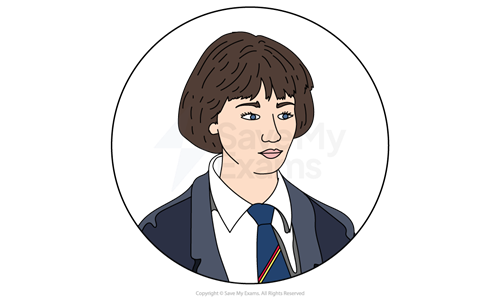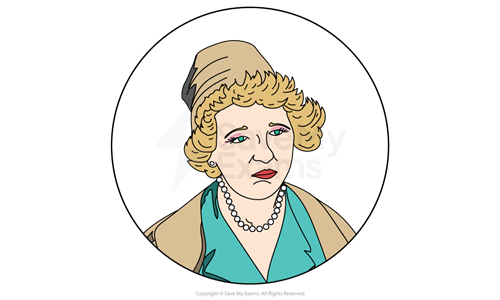A Taste of Honey: Character Quotations (AQA GCSE English Literature): Revision Note
Exam code: 8702
The exam could ask you to respond to a question on theme or character in A Taste of Honey. In order to provide evidence for your argument, it is best to know some key pieces of dialogue spoken by characters across the play, or to remember quotes that show patterns. This means you will avoid writing a character description and, instead, focus on character representation and development.
Here we will examine some important quotations from the following key characters:
Jo
Helen
Peter Smith
Geof Ingram
The Boy (Jimmie)
Examiner Tips and Tricks
Examiners say that it is best to use short quotes that support your argument rather than using long pieces of dialogue. Using shorter quotes has two benefits:
You can more easily embed the key word or phrase into your analysis
You can see patterns across the character’s speech, or zoom into a technique
By embedding short sections of quotations you will better focus on the impact of the language or a literary or dramatic technique. We’ve included a “key word or phrase” from each of our longer quotations to help you memorise only the most important parts of each quotation.
Jo
“Get out of your sight as a soon as I can get a bit of money in my pocket” — Jo, Act 1, Scene 1
 | Key word or phrase to memorise: “Get out of your sight” | What the quotation means: Jo tells her mother that as soon as she has a job she will move out to get away from her. | Theme: Motherhood and family |
| |||
“I don’t know much about love. I’ve never been too familiar with it” — Jo, Act 2, Scene 1
 | Key word or phrase to memorise: “Never been too familiar with it” | What the quotation means: When Geof asks Jo if she loved the Boy (Jimmie), she tells Geof that she is not sure as she does not know how to recognise love. | Theme: Independence and marriage |
| |||
“I can do anything when I set my mind to it” — Jo, Act 2, Scene 2
 | Key word or phrase to memorise: “I can do anything” and “set my mind to it” | What the quotation means: Jo tells Geof that she is determined to succeed and be self-reliant. | Theme: Independence and marriage |
| |||
Examiner Tips and Tricks
Understanding how Shelagh Delaney presents her characters in ways that deliver a message or explores a theme will help you reach the highest levels of the mark scheme. A great way to do this is to look for contrasts in the presentation of characters.
For example, it can be argued that Peter and Helen represent traditional values and that younger characters like Jo and Geof represent changing, more progressive social attitudes to ideas like gender and sexuality.
Helen
“I would never have dared talk to my mother like that when I was her age” — Helen, Act 1, Scene 1
 | Key word or phrase to memorise: “Never have dared talk to my mother like that” | What the quotation means: Helen comments to the audience about Jo’s rudeness to her. | Theme: Motherhood and family |
| |||
“How long is he going to stick around here. Bloody little pansy…” — Helen, Act 2, Scene 2
 | Key word or phrase to memorise: “Bloody little pansy” | What the quotation means: Helen refers to Geof with a derogatory and homophobic term when she asks how long he plans to stay at Jo’s flat. | Theme: Discrimination |
| |||
“He threw his money about like a man with no arms” — Helen, Act 2, Scene 2
 | Key word or phrase to memorise: “Like a man with no arms” | What the quotation means: Helen implies that Peter was not generous with his money. | Theme: Independence and marriage |
| |||
Examiner Tips and Tricks
Examiners view quotes as valuable references that support your understanding of themes or characters. For the best analysis, it is a good idea to consider how character dialogue changes (or does not change) over the course of the play, or to view quotes in relation to other characters.
For example, Jo’s determination to lead a different life to her mother is indicated by repeated comments about avoiding marriage throughout the play.
Peter
“Come on down to the church and I’ll make an honest woman of you” — Peter, Act 1, Scene 1
 | Key word or phrase to memorise: “An honest woman” | What the quotation means: Peter tells Helen she should marry him so that she will be perceived as a good woman. | Theme: Independence and marriage |
| |||
“Like hell it is. I could throw you out tomorrow” — Peter, Act 2, Scene 1
 | Key word or phrase to memorise: “Could throw you out tomorrow” | What the quotation means: When Peter tells Helen that Jo cannot stay at their house, she replies that the house half belongs to her, with which he disagrees and goes on to threaten her. | Theme: Independence and marriage |
| |||
“Look at Helen, isn't she a game old bird? Worn out on the beat but she's still got a few good strokes left” — Peter, Act 2, Scene 1
 | Key word or phrase to memorise: “Game old bird” and “on the beat” | What the quotation means: Peter insults Helen by implying she is an old prostitute, but still good enough for sex. | Theme: Discrimination |
| |||
Geof
“I’ll stay here and clear this place up a bit. Make you a proper meal” — Geof, Act 2, Scene 1
 | Key word or phrase to memorise: “I’ll stay here” and “a proper meal” | What the quotation means: Geof offers to help Jo during her pregnancy. | Theme: Motherhood and family |
| |||
“Stop trying to be inhuman. It doesn’t suit you” — Geof, Act 2, Scene 1
 | Key word or phrase to memorise: “Inhuman“ | What the quotation means: Geof is frustrated with Jo’s self-pity and callous comments about motherhood, so he tells her to stop putting on a facade. | Theme: Motherhood and family |
| |||
“There's one thing about this district, the people in it aren't rotten. Anyway, I think she's happier here with me than in that dazzling white house” — Geof, Act 2, Scene 1
 | Key word or phrase to memorise: “People in it aren’t rotten“ and “dazzling white house” | What the quotation means: Geof tells Peter that although the area where he and Jo live is disadvantaged, the people are not corrupted, and that Jo is happier away from a fake life in a better house. | Theme: Discrimination |
| |||
The Boy (Jimmie)
“I’m trapped into a barbaric cult" — Boy, Act 1, Scene 2
 | Key word or phrase to memorise: “Trapped” and “barbaric cult” | What the quotation means: When Jo and Jimmie plan to marry, he makes a joke about joining a cult and implies he will be imprisoned. | Theme: Independence and marriage |
| |||
“No. Cardiff. Disappointed? Were you hoping to marry a man whose father beat the tom-tom all night?" — Boy, Act 1, Scene 2
 | Key word or phrase to memorise: “Disappointed” and “tom-tom” | What the quotation means: When Jo asks Jimmie if his ancestors were from Africa, he says that they were from Wales, and that this information will be disappointing if she was hoping for him to be African. | Theme: Discrimination |
| |||
"She’ll see a coloured boy” — Boy, Act 1, Scene 2
 | Key word or phrase to memorise: “See a coloured boy” | What the quotation means: Jo’s boyfriend tells her that when he meets her mother she will not notice anything about him except for his skin colour. | Theme: Discrimination |
| |||
Sources
Delaney, Shelagh (2008), A Taste Of Honey (Edited by Glenda Leeming and Elaine Aston), Bloomsbury Academic.

Unlock more, it's free!
Was this revision note helpful?
